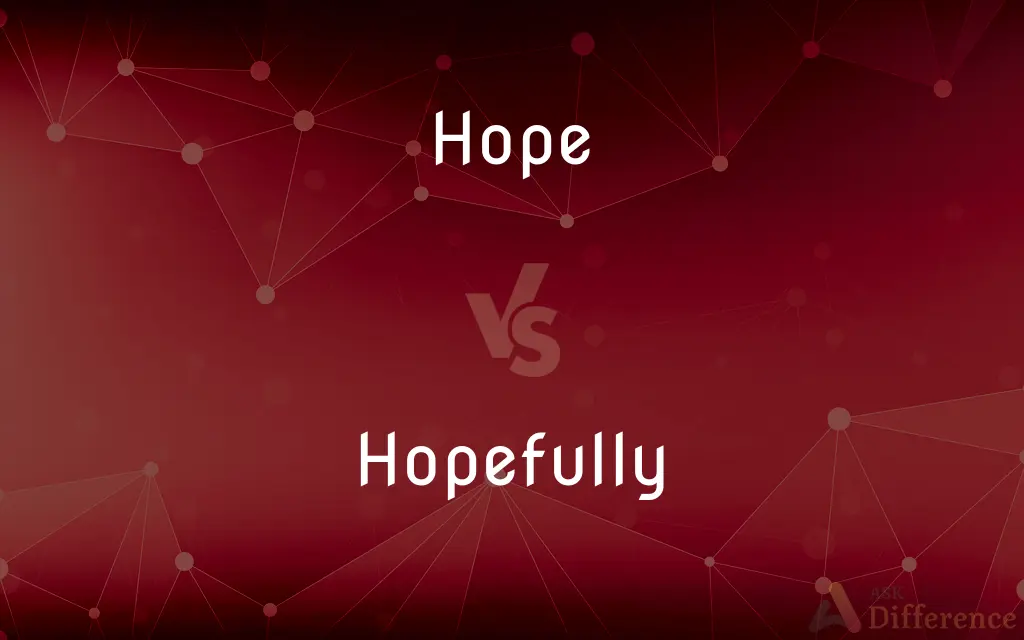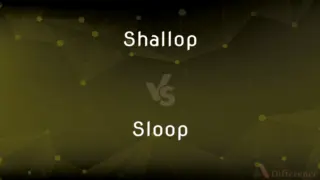Hope vs. Hopefully — What's the Difference?
Edited by Tayyaba Rehman — By Maham Liaqat — Updated on April 4, 2024
Hope expresses a desire for a specific outcome, focusing on the feeling itself, while hopefully denotes a hopeful manner, often used to convey a general sense of optimism about future events.

Difference Between Hope and Hopefully
Table of Contents
ADVERTISEMENT
Key Differences
Hope is a verb that signifies the desire or wish for something to happen or be true. It centers on an individual's internal longing or expectation for a specific outcome. Whereas, hopefully is an adverb that describes doing something with hope or expressing a hopeful attitude towards future events. It's often used at the beginning of sentences to express a wish for a favorable outcome in a general sense.
When we use hope, we're often talking about a specific desire or outcome. For example, one might hope for good weather on their wedding day. On the other hand, hopefully is used more broadly and can reflect an overall optimistic stance. For instance, saying "Hopefully, it won't rain" expresses a general wish without specifying who is doing the hoping.
Hope can be used in various grammatical structures, including as a noun or verb, to articulate more personal and precise wishes. It requires an object or clause to express what one is hoping for, as in "I hope you have a good day." However, hopefully functions as an adverb modifying verbs, adjectives, or entire sentences, and it doesn't require an object to convey a hopeful sentiment.
In conversations, hope often invites sharing of personal desires or goals, fostering a sense of empathy and connection between individuals. It can also imply a level of control or influence over the outcome. Conversely, hopefully suggests a relinquishing of control, acknowledging that the outcome is uncertain or dependent on external factors.
The use of hope is integral in expressing support or solidarity, as it directly addresses the subject of one's hope. It is more personal and specific, engaging directly with the hopes of others. Meanwhile, hopefully maintains a level of detachment and generality, making it suitable for situations where the outcome is uncertain or beyond one's control.
ADVERTISEMENT
Comparison Chart
Part of Speech
Verb/Noun
Adverb
Usage
Expresses a desire for a specific outcome
Expresses a general wish for the future
Specificity
Requires an object or clause
Can stand alone
Sentiment
Personal and direct
General and indirect
Context
Personal desires, specific wishes
Broad optimism, general situations
Compare with Definitions
Hope
To desire something with expectation of its fulfillment.
I hope you get the job.
Hopefully
Adverb: In a hopeful manner.
She looked hopefully at the sky for a sign of clear weather.
Hope
To trust or anticipate.
We hope to see you at the event.
Hopefully
Adverb: Used to express a wish or desire that something will happen.
Hopefully, we'll be on time.
Hope
A feeling of expectation and desire for a certain thing to happen.
Hope is what keeps us going.
Hopefully
Adverb: Reflecting optimism about a future event.
Hopefully, the meeting will end soon.
Hope
A person or thing that may help or save someone.
He is our last hope.
Hopefully
Adverb: With hope of good outcome.
They waited hopefully for news.
Hope
To aspire or wish for something.
I hope to travel to Japan next year.
Hopefully
Adverb: Indicative of a hopeful perspective.
Hopefully, this solution works for everyone.
Hope
Hope is an optimistic state of mind that is based on an expectation of positive outcomes with respect to events and circumstances in one's life or the world at large. As a verb, its definitions include: "expect with confidence" and "to cherish a desire with anticipation."Among its opposites are dejection, hopelessness, and despair.
Hopefully
Hopefully is an adverb which means "in a hopeful manner" or, when used as a disjunct, "it is hoped". Its use as a disjunct has prompted controversy among advocates of linguistic purism or linguistic prescription.
Hope
To wish for a particular event that one considers possible
We are hoping for more financial support.
Hopefully
In a hopeful manner
He rode on hopefully
Hope
(Archaic) To have confidence; trust.
Hopefully
It is to be hoped that
Hopefully the road should be finished by next year
Hope
To desire and consider possible
I hope that you will join us for dinner. We hope to buy a house in the spring.
Hopefully
In a hopeful manner
We began our journey hopefully.
Hope
The longing or desire for something accompanied by the belief in the possibility of its occurrence
He took singing lessons in the hope of performing in the musical.
Hopefully
Usage Problem It is to be hoped.
Hope
An instance of such longing or desire
Her hopes of becoming a doctor have not changed.
Hopefully
In a hopeful manner.
Hope
A source of or reason for such longing or desire
Good pitching is the team's only hope for victory.
Hopefully
(uncomparable) It is hoped that; I hope; we hope.
Hopefully, my father will arrive in time for the show.
She was buried with her mom and hopefully they are together now.
Hope
Often Hope(Christianity) The theological virtue defined as the desire and search for a future good, difficult but not impossible to attain with God's help.
Hopefully
In a hopeful manner.
Hope
(Archaic) Trust; confidence.
Hopefully
I hope; if all goes well; as, hopefully, the dress will be ready before the party.
Hope
To want something to happen, with a sense of expectation that it might.
I hope everyone enjoyed the meal.
I am still hoping that all will turn out well.
Hopefully
With hope; in a hopeful manner;
We searched hopefully for a good position
Hope
To be optimistic; be full of hope; have hopes.
Hopefully
It is hoped;
Hopefully the weather will be fine on Sunday
Hope
(intransitive) To place confidence; to trust with confident expectation of good; usually followed by in.
Hope
To wish.
Hope
The feeling of trust, confidence, belief or expectation that something wished for can or will happen.
I still have some hope that I can get to work on time.
After losing my job, there's no hope of being able to afford my world cruise.
There is still hope that we can find our missing cat.
Hope
(countable) The actual thing wished for.
Hope
(countable) A person or thing that is a source of hope.
We still have one hope left: my roommate might see the note I left on the table.
Hope
The virtuous desire for future good.
Hope
A hollow; a valley, especially the upper end of a narrow mountain valley when it is nearly encircled by smooth, green slopes; a combe.
Hope
A sloping plain between mountain ridges.
Hope
(Scotland) A small bay; an inlet; a haven.
Hope
A sloping plain between mountain ridges.
Hope
A small bay; an inlet; a haven.
Hope
A desire of some good, accompanied with an expectation of obtaining it, or a belief that it is obtainable; an expectation of something which is thought to be desirable; confidence; pleasing expectancy.
The hypocrite's hope shall perish.
He wished, but not with hope.
New thoughts of God, new hopes of Heaven.
Hope
One who, or that which, gives hope, furnishes ground of expectation, or promises desired good.
The Lord will be the hope of his people.
A young gentleman of great hopes, whose love of learning was highly commendable.
Hope
That which is hoped for; an object of hope.
Lavina is thine elder brother's hope.
Hope
To entertain or indulge hope; to cherish a desire of good, or of something welcome, with expectation of obtaining it or belief that it is obtainable; to expect; - usually followed by for.
But I will hope continually.
Hope
To place confidence; to trust with confident expectation of good; - usually followed by in.
Why art thou cast down, O my soul? and why art thou disquieted within me? Hope thou in God.
Hope
To desire with expectation or with belief in the possibility or prospect of obtaining; to look forward to as a thing desirable, with the expectation of obtaining it; to cherish hopes of.
We hope no other from your majesty.
[Charity] hopeth all things.
Hope
To expect; to fear.
Hope
A specific instance of feeling hopeful;
It revived their hope of winning the pennant
Hope
The general feeling that some desire will be fulfilled;
In spite of his troubles he never gave up hope
Hope
Grounds for feeling hopeful about the future;
There is little or no promise that he will recover
Hope
Someone (or something) on which expectations are centered;
He was their best hope for a victory
Hope
United States comedian (born in England) who appeared in films with Bing Crosby (born in 1903)
Hope
One of the three Christian virtues
Hope
Expect and wish;
I trust you will behave better from now on
I hope she understands that she cannot expect a raise
Hope
Be optimistic; be full of hope; have hopes;
I am still hoping that all will turn out well
Hope
Intend with some possibility of fulfilment;
I hope to have finished this work by tomorrow evening
Common Curiosities
How is hopefully different from hope?
Hopefully is an adverb that expresses a general sense of optimism or a wish for the future, without specifying a subject.
How does the specificity of hope compare to hopefully?
Hope is more specific, often requiring an object or a clause to express what is being hoped for, whereas hopefully is more general and can stand alone.
What does hope mean?
Hope refers to a feeling of expectation and desire for a specific outcome to happen.
Is it grammatically correct to start a sentence with hopefully?
Yes, it's common and acceptable to start a sentence with hopefully when expressing a general wish for the future.
What is an example of hope being used as a verb?
"I hope to complete my project by the end of the week."
Can hope be used as a noun?
Yes, hope can also be a noun representing the feeling of wanting something to happen.
Can hope and hopefully be used interchangeably?
No, they serve different grammatical functions and convey different levels of specificity and sentiment.
Is there a difference in the emotional impact of hope and hopefully?
Hope tends to convey a more personal and direct emotional impact, while hopefully is more detached and general.
Can hopefully modify an entire sentence?
Yes, hopefully can modify an entire sentence to express a general wish or hope.
Is hopefully a formal or informal expression?
Hopefully is considered acceptable in both formal and informal contexts, but its usage may vary based on stylistic preferences.
In what context is hopefully most appropriately used?
Hopefully is most appropriate in contexts where the speaker wishes for a positive outcome but recognizes the outcome's uncertainty.
How does the audience's perception differ when using hope vs. hopefully?
Using hope might engage the audience more personally, while hopefully may be perceived as less direct and more general.
Can the use of hope express support?
Yes, expressing hope for someone can be a way of showing support or solidarity.
How do hope and hopefully relate to control over outcomes?
Hope might imply a degree of control or influence over the outcome, whereas hopefully acknowledges the outcome's uncertainty.
Are there situations where hope or hopefully should be avoided?
Both terms are widely applicable, but choosing between them depends on the desired specificity and emotional tone of the message.
Share Your Discovery

Previous Comparison
Citizenry vs. Citizenship
Next Comparison
Shallop vs. SloopAuthor Spotlight
Written by
Maham LiaqatEdited by
Tayyaba RehmanTayyaba Rehman is a distinguished writer, currently serving as a primary contributor to askdifference.com. As a researcher in semantics and etymology, Tayyaba's passion for the complexity of languages and their distinctions has found a perfect home on the platform. Tayyaba delves into the intricacies of language, distinguishing between commonly confused words and phrases, thereby providing clarity for readers worldwide.














































